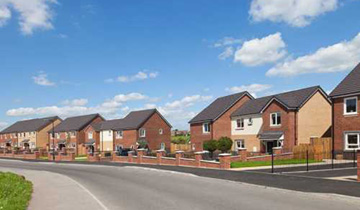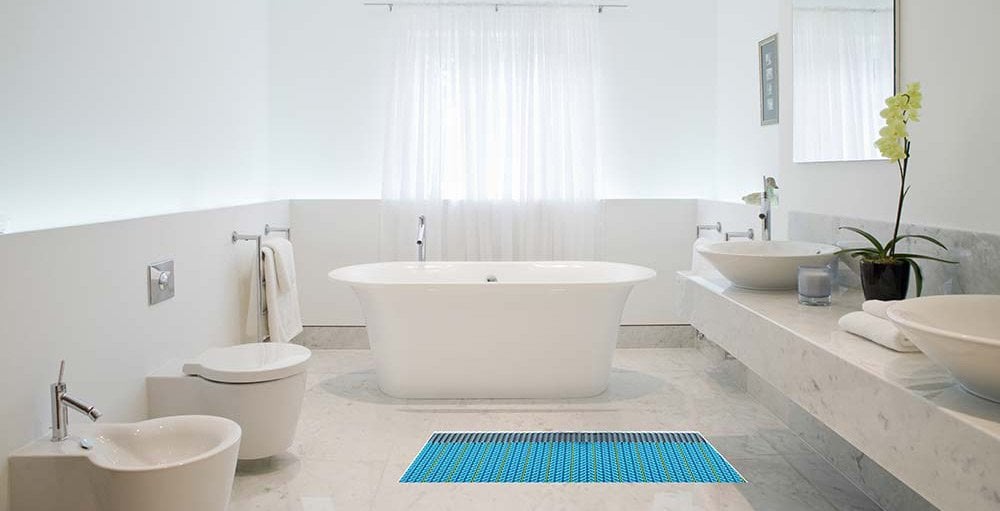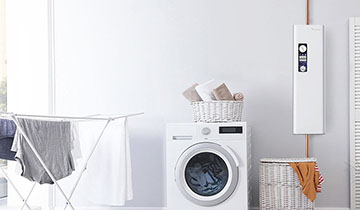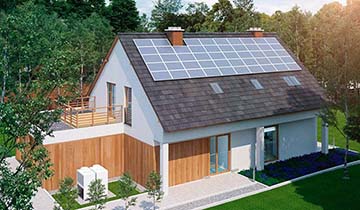5 min read
Why underfloor heating can add value to your home...
This year, Rated People launched their annual Home Improvement Trends Report: 2020. Over 1,000 homeowners responded to a 51-question survey and the...

The Future Homes Standard was launched earlier in 2019 as part of a statement from the UK government and later in the same year the public consultation was run. If you ‘Google’ it, you will find hundreds of articles about it. But what does it all mean and in particular, what does it mean for home heating? Fear not. We’ve pulled together the latest facts along with some heating considerations for new builds and retrofits of the future.
The UK was one of the first major world economies to set a ‘net-zero’ and legally binding goal for carbon emission reduction by 2050. As part of the plan to achieve this ambitious target the Future Homes Standard was launched to help reduce carbon emissions from housing.
The Future Homes Standard aims to ensure that by 2025 all new build homes would include the highest energy efficient standards which will incorporate low-carbon heating alternatives that would help produce between 75% and 80% less carbon than those built to existing regulations. One of the proposals to help achieve this is banning gas boilers in new builds. The new rules will be weaved into Part L of the Building Regulations.
To help the industry adapt to the new proposed rules for 2025, the government laid out interim proposals. Unfortunately these have been delayed because of the coronavirus pandemic but it is anticipated that they will come into effect in 2022 instead.
We’ve outlined some of the key points below…
The timetable for the Future Homes Standard to come into effect currently looks like:
1st Phase
December 2021: Interim regulations enacted
June 2022: Interim regulations come into effect
2nd Phase
Autumn 2021 – Summer 2022: Research for technical specifications
Summer 2022 – 2024: Development of sector specific guidance for the above technical specifications
3rd Phase
Spring 2023: Public consultation relating to technical specifications
4th Phase
2024: Future Homes Standard regulations enacted
2025: These regulations come into effect
Where the Future Homes Standard is welcomed by many in the building of new homes to help contribute to the government’s net-zero carbon targets, concerns lie with retrofitting existing building stock and there is no real clear guidance on how that could be achieved. Challenges such as training and upskilling builders has also been flagged by the Federation of Master Builders.
Low carbon heating which includes heat pumps, alternative heat networks and direct electric heating will play a huge role when it comes to regulatory compliance and moving towards the net-zero carbon target. This is due to the low-carbon emissions factor of these sources. This is something that has also been highlighted in the latest SAP 10 iterations. For example slashing the carbon emission factor of electricity to
0.136 kgCO2/kWh from 0.519 kgCO2/kWh which makes electric heating a seriously viable option for new builds and retrofitting alike.

Environmentally friendly
Electric heating is clean and respectful to the environment. There are no polluting gases or heavy metals. This is one of the key reasons why the UK government are planning to ban gas boilers in new builds by 2025.
Simply controlled
Changes in air flow and differences in room sizes can mean some parts of the house are warmer than others. With electric heating you can control the warmth in different rooms more effectively which helps to provide a continuous and balanced level of heat. A complete connected heating solution can help reduce annual heating costs by up to 30%!
Almost zero maintenance
There are no moving parts which means that an electric heating system rarely breaks down. There are no water-filled pipes so there is less risk of property damage from burst pipework. We would recommend a regular annual service especially before turning it on ready for winter. Don‘t forget that every ThermoSphere electric underfloor heating system comes with a lifetime warranty!
Affordable
Electric underfloor heating systems in particular are easy and cost-effective to install. It only costs 14p to heat a 2.5m2 bathroom in London for 3 hours a day with electric underfloor heating…it costs 2.5p every time you boil a kettle!
Energy efficient
Electric heating is almost 100% energy efficient at point of use. All the electricity you use and pay for converts into heat.
ThermoSphere offer a range of options for all project types and have a large network of qualified and helpful retailers and installers across the UK. Each reseller partner can help you determine your best options but to help you get a better understanding of what you may require for your project we have outlined some options below.
One of the most popular forms of heating is electric underfloor heating. This is with great reason too. An electric underfloor heating system can take as little 20-30 minutes to heat a room to the desired temperature so it’s much faster than its wet underfloor heating counterpart. Electric underfloor heating is also incredibly easy to install and retro-fit but it must signed-off or (ideally) connected by a qualified electrician. Read how electric underfloor heating compares with traditional heating systems.
But there are so many options out there, how do I know which one is right for your project? There may be instances where you require a mix of heating systems. Fear not. ‘Your guide to electric underfloor heating mats’ is a great article that will guide you through the right choice to make.

Having an electric boiler installed in your home is not only the greener choice when compared to gas or oil, as there is no need to burn fossil fuels, they are far more energy efficient and thus kinder to the environment as well.
Many models of electric boilers, like our Slimline Electric Boilers, are between 99-100% efficient, outperforming appliances powered by gas or oil which rarely score above 93%. There is also the added benefit of no pilot light or potentials for gas leaks within your home by using one of these units.
So, what does this mean? With no waste products being pumped into the atmosphere, electric boilers are a greener choice for the environmentally conscious. And they are also the better choice for space challenged homes.
We know this blog has gone through a lot of information and you may wish to do further research but if you’d like to discuss your options or know more about how the Future Home Standards affect your home and your heating options then contact us today, or request a hassle-free quote.

5 min read
This year, Rated People launched their annual Home Improvement Trends Report: 2020. Over 1,000 homeowners responded to a 51-question survey and the...

9 min read
If you’re one of over 2 million homes in the UK not connected to a mains gas supply you know the challenges surrounding heating your home. In this...

5 min read
Over the next two years the government will be gearing up to overhaul the current Standard Assessment Procedure (SAP) system for assessing the energy...